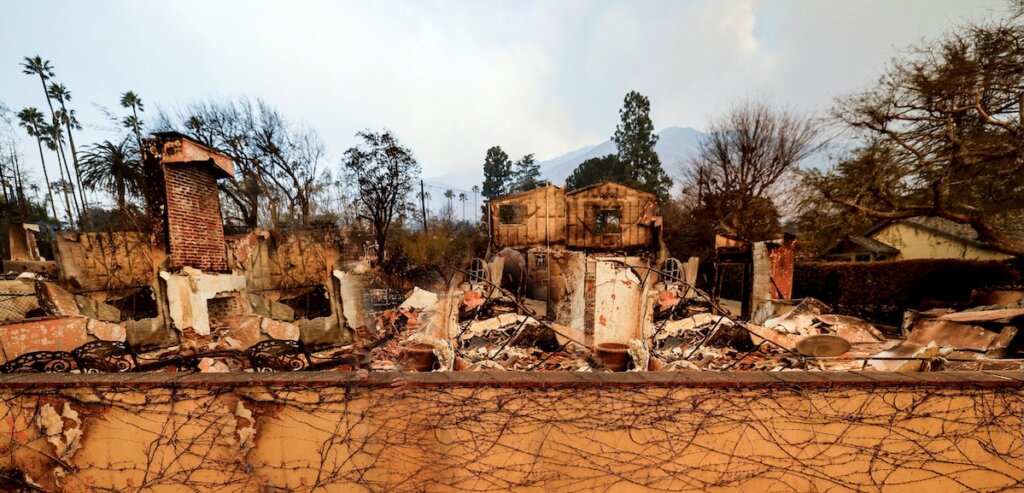The Eaton Fire devastated the Black community of Altadena. The writer, who was visiting her family in her L.A. hometown, bore witness up close to the nightmare she never thought possible.
This article was made possible because of the generous support of DAME members. We urgently need your help to keep publishing. Will you contribute just $5 a month to support our journalism?
On Monday, I got a cheap flight to Los Angeles to see my family with plans to spend some quality time with my grandson in Pasadena. He always lifts my spirits. I am an adjunct professor and needed to make a quick turnaround before the semester began next week. But nothing could have prepared me for what I witnessed less than 24 hours after my plane touched down at LAX.
I watched my hometown of Altadena and Pasadena, California, burn down. I’d just emerged from a brutal year—I lost a job, my home, and had to move a thousand miles to care for my elderly mother. I was depressed, I was homesick—I needed some time with my family.
Home for me encompasses Pasadena, Temple City, Los Angeles, and San Bernardino County. I hate to admit it, but I’ve come to expect wildfires in Southern California—they have become so common, it’s practically an annual event, so initially I didn’t give it much thought when I heard they were coming as my plane touched the tarmac. Yes, the Santa Ana winds were blowing when my son picked me up from LAX, and smoke was whipping through the air, but everything was moving along like any other day—until it wasn’t. Then everything suddenly stopped. Except the fires, which came like rage and ravaged the city.
West Altadena, a historic center for California’s Black cowboys, and my home during my formative years, is now in ashes. Childhood friends have lost their entire communities: the homes they grew up in, the schools from which they graduated, the stores where they regularly shop. All of it, gone. Funerals are being cancelled. Businesses are burning down or severely damaged. Whole towns and neighborhoods are being destroyed. Unhoused people can’t receive evacuation notices. Incarcerated youth are trapped in the path of those flames. The survivors of these fires—adults and children both—inevitably will suffer from PTSD for years to come. In the meantime, where will the evacuees go in the long term?
Social-media can be an incredible tool especially in times of crisis like this one, allowing us to share resources with one another. But it can also be a cesspool full of uninformed, over-opinionated idiots who are trading conspiracy theories, pointing fingers, and trashing victims. All of that is abhorrent, but it’s especially awful to drag people who have just been through the worst fire in California’s history. Many are doing so because they believe that the majority of L.A.’s population comprises celebrities and millionaires.
I’ve watched as many celebrities have spoken about their losses, on TV and on social media. I’ve read the post about Paris Hilton watching her home burn live on TV. Of course L.A.—a huge city that is home to 3.8 million people— isn’t all rich and famous people. But now 179,000 Angelenos either no longer have a home, or their home is currently inhabitable due to damage to their neighborhoods, infrastructure, or air quality. Let’s focus on them and stop all of this other nonsense.
A few weeks ago, an 80-year-old friend of my mother’ s offered to let me stay in the spare room of her house in Altadena for part of my visit so I wouldn’t have to pay for a hotel room, which can get expensive. But the night before I was to arrive at her house, she texted me to say she had to evacuate from her home. By Wednesday, her house, where she’s lived for three decades, was gone.
So many of my family and friends were advised to leave their homes on Tuesday. I started receiving voicemails and text messages from friends on Tuesday night worried that I might not be able to land—fortunately, I’d arrived earlier that morning. Initially, many people I knew were walking or driving around looking bewildered and lost without a place to go because they couldn’t afford to secure shelter in hotel rooms. By Tuesday night, churches, fitness facilities, and the Convention Center started to open up to service evacuees, while the Rose Bowl was set up to house firefighters. But most everyone is wondering where they will live long term once the fires stop and the cleanup begins. When my hometown became a hashtag on social-media posts—#Altadena Is Not For Sale, Pray for #Pasadena and #DenaStrong, which I added to my own status—reality set in for me.
I found myself starting to be critical of the rich and famous. As a divorced mother with four kids who struggles financially, I admittedly cringed at all the attention paid to all the celebrities who appear to have access to resources to regroup and rebuild when so many members of my community do not. But I recognize that loss is loss, and grief is devastating, pure and simple.
I never imagined something so enormously tragic like a wildfire of this magnitude would happen to me and my community, but it has. And that means it can also happen to you. If any of this has taught us anything, it is that something that we love and cherish can be here one minute and gone the next. For all of those who have visited Southern California’s tourist attractions and beaches and believed that only celebrities and millionaires live in L.A., I am here to speak for the millions of us who will remain nameless and invisible among the thousands of images shared online. We are not all rich and famous. And even more of us are not white.
